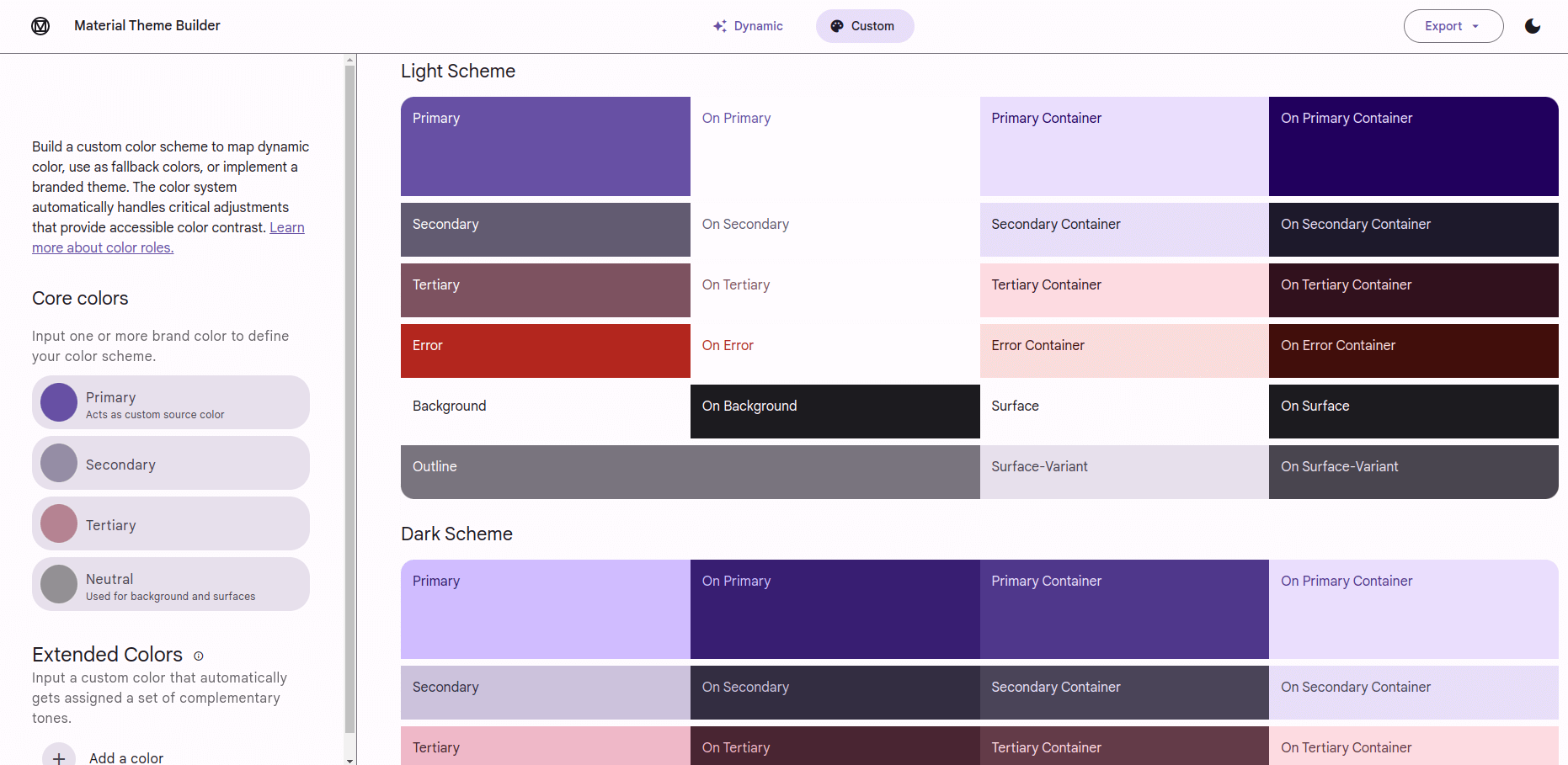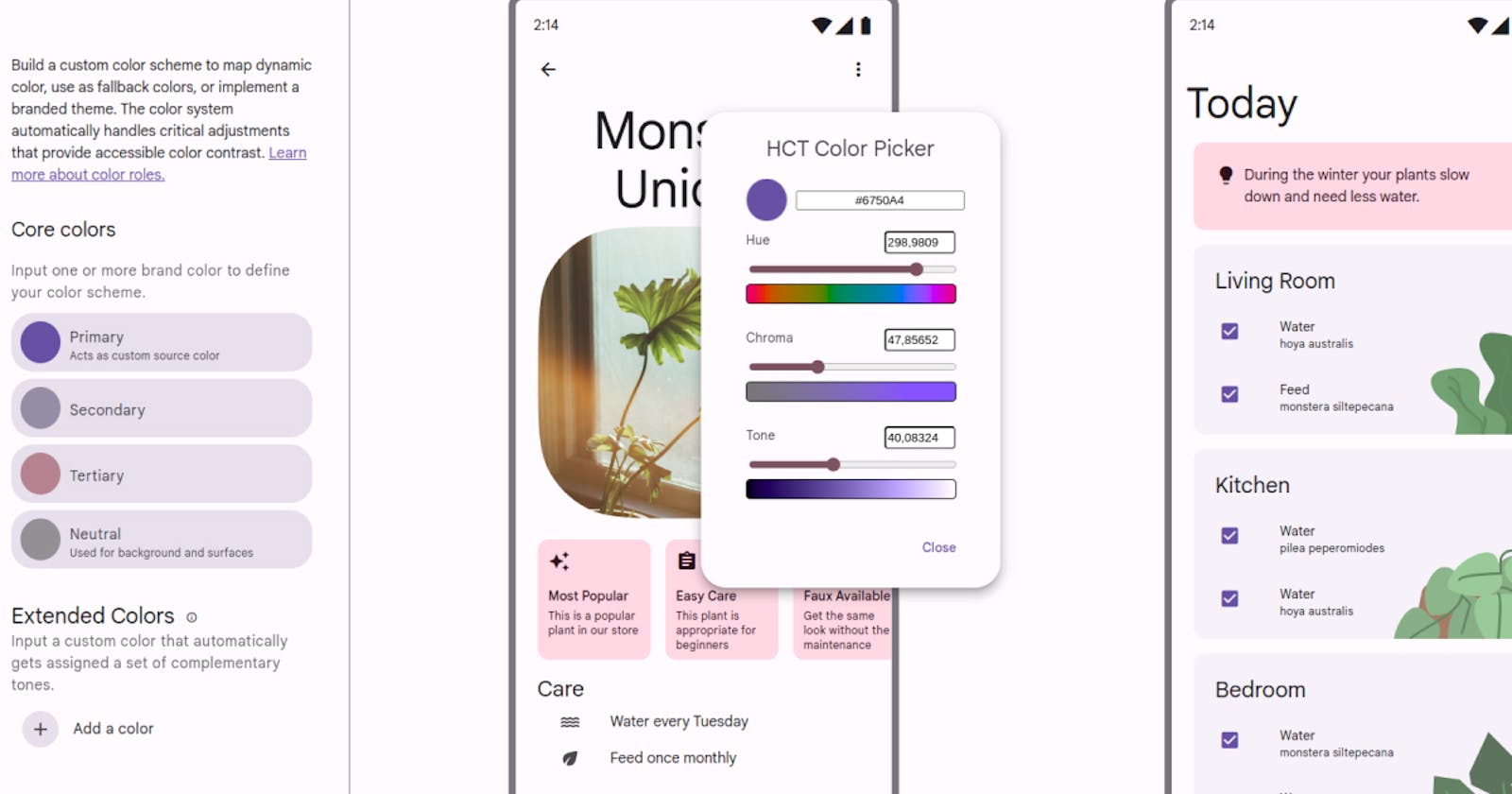Using Beautiful Material Themes from Material Theme Builder in Stylify CSS
Material Theme Builder is a tool with which you can easily generate Material Theme color palettes and typography sizes for your website.
Features:
✅ Theme colors can be generated from an uploaded image or by using their color picker.
✅ Configured theme can be exported into Theme.kt, XML, Dart, CSS and DSP.
✅ There is a nice preview of each color and a simple explanation how it should be used.
✅ Colors are generated for ligh/dark mode
✅ Web export is using CSS variables
This guide explains how to generate Material Theme, how to export it into CSS file and how to use it in Stylify CSS.

Playground
Stylify has prepared playground with Vite.js. You can check out the configuration and use it within your project.
The vite plugin configuration can be used within all integrations. This means for example Next.js, Nuxt.js, SvelteKit, Vite.js, Webpack and any other.
How to get a custom Material Theme
Generating the desired theme with the Material Theme Builder is simple:
Go to the Material Theme Builder website.
On the left side (on Desktop), click on the primary color.
The color generator dialog will appear. Select your favorite color.
Optionally, repeat this process for a secondary, tertiary and neutral color.
When you finish the configuration, in the top right corner, there is an export button
Click on it and select Web (CSS).
Download the file and extract it into your project.
In case you wonder, how to use each color, make sure to check out the section under the device preview. There are color palettes with the name of each color:
For example
on-primarycolor should be used for text onprimarycolor. This means for example a button with primary color background (purple) and on primary text color (white)Colors are split for light/dark mode
The complete guide can be found in material theme docs

Integrating Material Theme into Stylify CSS
To finish the configuration process, you have to configure Stylify, so it knows, that variables starting with md- are external and that it has to replace variables with CSS variables instead of their value.
With Unplugin
This part is for @stylify/unplugin exports: stylifyVite, stylifyWebpack, stylifyEsbuild and stylifyRollup.
If you use the Unplugin in your project (Next.js, Nuxt.js, SvelteKit, Vite, Webpack, Rollup or any other), this guide is what you are looking for:
const stylifyConfig = {
compiler: {
replaceVariablesByCssVariables: true,
externalVariables: [
// Add external variables identifier
// This one checks, if variable starts with md-.
// If so, it is marked as external.
// Do not add --md. Identifier methods works with Stylify variable name
// and not CSS variable name. Stylify adds -- automatically
// if CSS variables are enabled
(variable) => {
if (variable.startsWith('md-')) return true;
}
]
}
// ...
};
stylifyVite(stylifyConfig);
stylifyWebpack(stylifyConfig);
stylifyRollup(stylifyConfig);
stylifyEsbuild(stylifyConfig);
Astro integration
The config is the same like for Unplugin.
stylify(stylifyConfig);
Bundler
In case you use @stylify/bundler directly, use the stylifyConfig from the above section about Unplugin Integration, but you have to pass it into the Bundler initialization.
const bundler = new Bundler({
...stylifyConfig
});
Usage
The final step is to import the generated theme into our project:
Extract the generated theme into your project.
Import the
theme.cssfile into your project (make sure the directory is public). This file will import all other necessary files.
If you care about optimization a bit, this will also cause at least 4 HTTP requests because of the @import rules within the theme file. You might want to copy the content of those other files into the theme.css file or merge them using some bundler to decrease the number of requests.
When the file is imported into your project, you can start using Material Theme CSS variables in Stylify CSS utilities.
<button class="
border:none
padding:8px_12px
border-radius:24px
background:$md-sys-color-primary
color:$md-sys-color-on-primary
display-large
">Material Button</button>

Cleanup
In case you plan to use Stylify CSS utilities only, then you can remove the colors.module.css. It contains utilities for color and background.
Apart from the colors module, there is a typography.module.css. You might want to remove it as well and rewrite these classes into Stylify CSS components using Stylify dynamic components syntax.
const stylifyConfig = {
compiler: {
components: {
// Example for display class
// This matches display-small/medium/large
// and returns utilities dynamically based on the matched size
'display-(small|medium|large)': ({ matches }) => `
font-family:$md-sys-typescale-display-${matches[1]}-font-family-name
font-style:$md-sys-typescale-display-${matches[1]}-font-family-style
font-weight:$md-sys-typescale-display-${matches[1]}-font-weight
font-size:$md-sys-typescale-display-${matches[1]}-font-size
letter-spacing:$md-sys-typescale-display-${matches[1]}-tracking
line-height:$md-sys-typescale-display-small-height
text-transform:$md-sys-typescale-display-${matches[1]}-text-transform
text-decoration:$md-sys-typescale-display-${matches[1]}-text-decoration
`
}
}
}
Let me know what you think!
If you like the idea, let me know that by starring Stylify repo ❤️.
I will be happy for any feedback! The Stylify is still a new Library and there is a lot of space for improvement 🙂.
Also, a big thanks go to Oscar Lito M Pablo that came up with the idea to make this guide.
